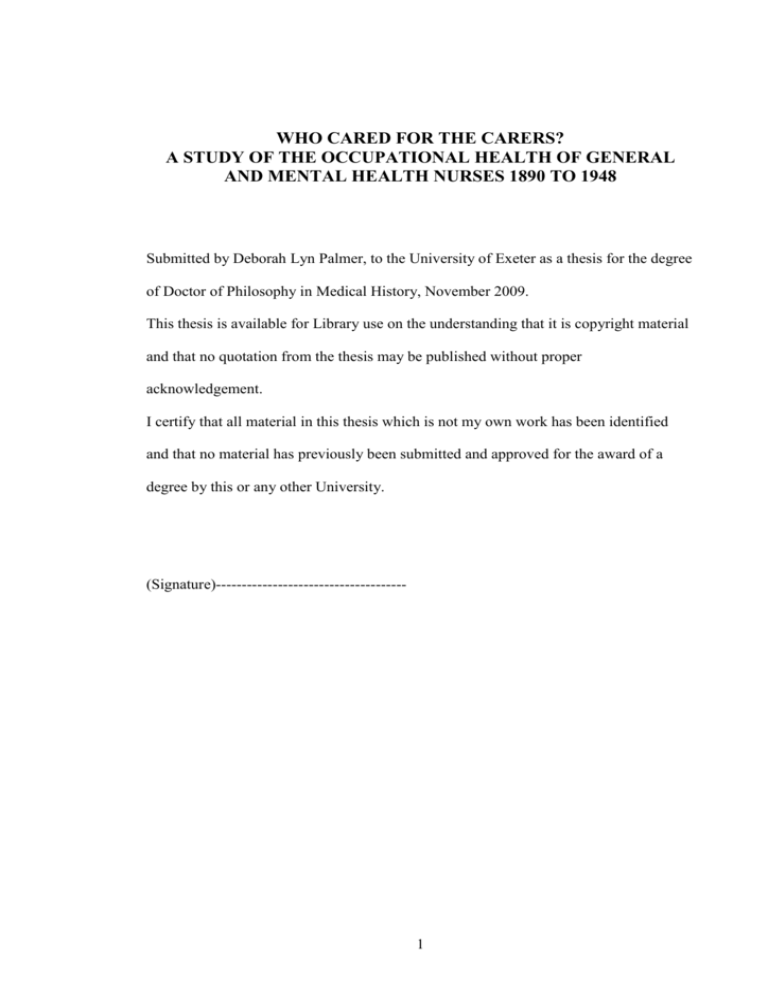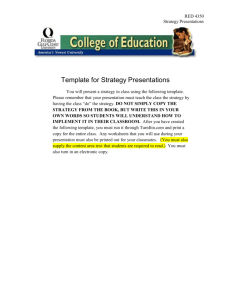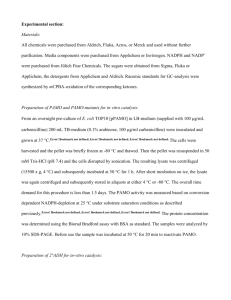title page and declaration - Open Research Exeter (ORE)
advertisement

TITLE PAGE AND DECLARATION WHO CARED FOR THE CARERS? A STUDY OF THE OCCUPATIONAL HEALTH OF GENERAL AND MENTAL HEALTH NURSES 1890 TO 1948 Submitted by Deborah Lyn Palmer, to the University of Exeter as a thesis for the degree of Doctor of Philosophy in Medical History, November 2009. This thesis is available for Library use on the understanding that it is copyright material and that no quotation from the thesis may be published without proper acknowledgement. I certify that all material in this thesis which is not my own work has been identified and that no material has previously been submitted and approved for the award of a degree by this or any other University. (Signature)------------------------------------- 1 ABSTRACT This thesis set out to explore the neglected field of nurses’ occupational health. Evidence from the three case study hospitals confirms that attitudes toward nurses’ health changed between 1888 and 1948. The health of nurses was an issue that was always taken seriously but each institution approached the problem differently and responses showed much variation over time. There were good reasons for this but the failure to adopt a coherent and consistent policy worked to the detriment of nurse health. This difficulty helps explain the ambiguous treatment of occupational health within wider histories of nursing. This can lead to the erroneous conclusion that occupational health was somehow neglected by contemporary actors, thereby facilitating the omission of the subject from historical studies concentrating on professional projects and the wider politics of nursing. This study takes a different approach showing that occupational health issues were inexorably connected to these nursing debates. Occupational health cannot be understood without reference to professional projects. This is as true in debates where occupational health was obscured as it was in cases of overt concern. The history of the occupational health of nurses is also important because it offers a new perspective on two other themes central to nursing history, particularly class and gender. This focus helps understand why attitudes towards the care of sick nurses changed over time and varied between different types of institutions. By concentrating on individual nurses’ experiences we reveal something new about the way national conversations affected ordinary nurses’ lives. Recognition that nursing presents a serious occupational health risk is a relatively recent phenomenon; it was not until the 1990s that most nurses had access to occupational health units. This study not only sheds light on why nurses’ health attracted little attention before the Second World War but also explains why this situation began to change from the 1940s. 2 TABLE OF CONTENTS TITLE PAGE AND DECLARATION 1 ABSTRACT 2 TABLE OF CONTENTS 3 LIST OF TABLES 5 LIST OF FIGURES 5 DEFINITIONS AND ABBREVIATIONS 6 CHAPTER ONE Introduction Error! Bookmark not defined. Historiography Error! Bookmark not defined. Nurses’ Health, Discipline, Class and Gender Error! Bookmark not defined. CHAPTER TWO “To Help A Million Sick, You Must Kill A Few Nurses.” Discipline and Nurses’ Illness 1890-1919 Error! Bookmark not defined. The London Hospital Error! Bookmark not defined. The South Devon and East Cornwall Hospital, Plymouth Error! Bookmark not defined. The Cornwall Lunatic Asylum Error! Bookmark not defined. Conclusion Error! Bookmark not defined. CHAPTER THREE ‘The twelve hours system is a cruel strain on a woman’s strength and nerve.’ Gender, Class and the Nurse’s Body 1890-1919Error! Bookmark not define Gender - Was nursing ‘extremely hard work for a woman?’Error! Bookmark not defined. ‘The Trial to Women of the Better Class’ Error! Bookmark not defined. Occupational Diseases Error! Bookmark not defined. Overstrain Error! Bookmark not defined. Conclusion Error! Bookmark not defined. CHAPTER FOUR A Comparison of Voluntary Hospital and Asylum Nurses’ Roads to Nursing Professionalism 1914-1920 Error! Bookmark not defined. The Cornwall Lunatic Asylum Error! Bookmark not defined. Female nurses and the October 1918 strike Error! Bookmark not defined. The South Devon and East Cornwall Hospital Error! Bookmark not defined. The College of Nursing versus the Professional Union of Trained Nurses 1919 Bookmark not defined. Conclusion Error! Error! Bookmark not defined. CHAPTER FIVE Nurses’ Registration Bill 1919 Error! Bookmark not defined. The creation of the Ministry of Health and its attitude to nurses’ registration Bookmark not defined. Error! Hours of Employment Bill, 1920 Error! Bookmark not defined. Unemployment Act of 1920 Error! Bookmark not defined. The Politics of Nurses’ Occupational Health Error! Bookmark not defined. Conclusion Error! Bookmark not defined. 3 CHAPTER SIX “The disease which is most feared.” The Interwar Years: the problem of tuberculosis and its threat to nurses’ health 1930-1948Error! Bookmark not defined. TB not considered a health risk to nurses 1890-1924 Error! Bookmark not defined. A threat to nurses’ health 1924-1932 Error! Bookmark not defined. Case study hospitals in the 1930/40s Error! Bookmark not defined. Hospital environment, nurses’ lifestyles and military styles of discipline Error! Bookmark not defined. Vaccination Error! Bookmark not defined. The Prophit Survey Error! Bookmark not defined. A compensable disease Error! Bookmark not defined. Conclusion Error! Bookmark not defined. CHAPTER SEVEN The influence of industrial psychology on the recruitment and welfare of general and mental nurses 1930-1948 Error! Bookmark not defined. Industrial Psychology Error! Bookmark not defined. The Lancet Commission 1932 Error! Bookmark not defined. Discipline in the case study hospitals in the 1930s Error! Bookmark not defined. Self-Discipline, Freedom and Preparations for War Error! Bookmark not defined. The War Years Error! Bookmark not defined. Preparations for a National Health Service 1946 -1948 Error! Bookmark not defined. Conclusion Error! Bookmark not defined. CHAPTER EIGHT Conclusion Error! Bookmark not defined. Understanding Nurses’ Sickness Error! Bookmark not defined. Professional Battles and Management Strategies Error! Bookmark not defined. Gender Error! Bookmark not defined. BIBLIOGRAPHY Error! Bookmark not defined. 4 LIST OF TABLES Table 1. The number of SDEC probationers who left training because of ill health 1903-1919 ............................................................... Error! Bookmark not defined. Table 2. Reasons why probationers left South Devon and East Cornwall Hospital 19301940 ......................................................................... Error! Bookmark not defined. LIST OF FIGURES Figure 1. The incidence of sickness amongst probationers in the South Devon and East Cornwall Hospital 1903 - 1928 ............................... Error! Bookmark not defined. 5 DEFINITIONS AND ABBREVIATIONS Attendant Generally used to describe male nurses until 1919 when it was replaced by nurse. However, variations occurred between hospitals. At the Cornwall Lunatic Asylum, the term attendant applied to both male and female nurses until the early twentieth century. At The London Hospital, male nurses continued to be called attendants in the 1940s. AWA Asylum Workers’ Association BCG Bacillus Calmette-Guering BJN British Journal of Nursing CLA Cornwall Lunatic Asylum (1850-1930) CMH Cornwall Mental Hospital (1930-1948) GNC General Nursing Council HMWC Health and Munition Workers’ Committee IFRB Industrial Fatigue Research Board IIAC Industrial Injuries Advisory Council MRC Medical Research Council NAWU National Asylum Worker’s Union NCW National Council of Women NHS National Health Service NICE National Institute for Health and Clinical Excellence NIIP National Institute of Industrial Psychology Nurse probationer A nurse in training from 1890 until the early 1920s. The term then changed to student nurse. NUTN National Union of Trained Nurses NUWW National Union of Women Workers PUTN Professional Union of Trained Nurses RBNA Royal British Nurses’ Association SDEC South Devon and East Cornwall Hospital (1831-1990) TB Tuberculosis VAD Voluntary Aid Detachment nurses 6 7








